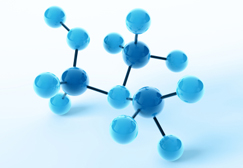Lactose
Lactose can be measured in the Industrial & Biotechnology applications.
Please see examples below.
Industry & Biotechnology
Lactose is usually measured in the food & beverage, fermentation and culture control applications
Industry & Biotechnology
A simple two-step electrochemical enzymatic assay for lactose in aqueous solutions or extracts.
Principle
i) Lactose (milk sugar), a disaccharide, is stoichiometrically hydrolysed by galactosidase to a-D-glucose and galactose in a simple pre-reaction. Under the special buffer conditions used, mutarotation to ß-D-glucose rapidly occurs:

ii) In the presence of molecular oxygen, ß-D-glucose is oxidised by the enzyme glucose oxidase to gluconic acid and hydrogen peroxide:
 Under the conditions of the assay, oxygen consumption is directly proportional to glucose concentration, which relates directly to the original lactose concentration. Any glucose originally present is measured directly after aqueous dilution as in the galactosidase pre-reaction.
Under the conditions of the assay, oxygen consumption is directly proportional to glucose concentration, which relates directly to the original lactose concentration. Any glucose originally present is measured directly after aqueous dilution as in the galactosidase pre-reaction.
Technical Summary
| Samples | Aqueous solutions and extracts |
| Sample Volume | 5µl or 10µl |
| Analysis Time | 20 seconds (analyser) |
| Analytical Range | 0.5 - 20 %W/V All analysers |
| Reagent Stability | Shelf-life 9 months unopened stored at 0 - 5°C |
Notes:
Sample opacity or turbidity presents no problem since the sensor system is electrochemical rather than spectrophotometric.
Endogenous glucose, if present, should be determined as a sample 'blank', i.e. extract diluted pro-rata in water instead of ß-galactosidase.
Incomplete hydrolysis may take place for lactose concentrations greater than 10 %W/V. For greater accuracy at these levels repeat hydrolysis using a 5µl sample and scale results as detailed in kit instructions.
Analysers
No analysers are currently available for this analyte.


